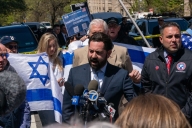You have /5 articles left.
Sign up for a free account or log in.
When it comes to introductory courses in religion and theology, the big division isn't a question of faith, but of priorities.
Students want lots of discussion in class sessions and they want to learn facts about religious groups. They also want to become better people. Professors aren't opposed to any of those things, but they are much more interested in teaching critical thinking. While the numbers vary, the gap between students' and professors' goals for these courses is evident at both religious and non-religious institutions.
These are among the results of a national survey of introductory courses in religion and theology. The study will be published in book form next year, but the lead investigator -- Barbara E. Walvoord of the University of Notre Dame -- gave a preview of the findings Sunday to a standing-room-only audience at the annual meeting of the American Academy of Religion. She spoke of the "great divide" between what professors want to accomplish and what students want to achieve -- and a panel of professors who teach intro courses offered their take on dealing with the divergence.
Walvoord's study involved surveys of students and faculty members in 533 introductory courses at a wide range of colleges. More than 12,000 students participated. For Sunday's presentation, Walvoord presented data from 66 courses whose instructors had been identified by their institutions as "highly effective." Walvoord said that the data on course goals was consistent with the larger group.
Both students and professors were asked whether certain goals were important. The percentages below are those who said that those goals were either "essential" or "important" for the introductory courses. The secular college category includes both public colleges and private nonsectarian colleges. In most cases at religious colleges, the courses were required and at secular colleges, the courses were not required but were one way to fulfill a general education requirement or enter a major.
Faculty and Student Priorities for Intro Religious Studies Courses
| Goal | Faculty at religious colleges | Students at religious affiliations | Faculty at secular colleges | Students at secular colleges |
| Develop critical thinking | 84% | 65% | 92% | 59% |
| Develop students' moral and ethical values | 52% | 73% | 25% | 54% |
| Develop students' own religious beliefs | 42% | 70% | 8% | 51% |
| Consider or strengthen students' commitment to a particular set of beliefs | 29% | 63% | 17% | 43% |
Walvoord noted that the statistics are surprising for many kinds of institutions -- noting the low percentages of professors at religious institutions with moral and religioius agendas for their students, and the high percentages of students at secular institutions with hopes for such an experience in class.
Among other findings:
- Students are much more interested than professors in learning facts about religion and discussing "big questions" about the meaning of life.
- Discussion is crucial to students. When students in "highly effective" courses were asked what part of the classes was most helpful, discussion was the top answer. When those same students were asked about how the courses could be improved, the top answer was: more discussion.
- Many students take courses in religious studies fully expecting their views to be challenged. About 40 percent of "secure Christians" (those with no doubts about their faith) reported that they expected their beliefs to be challenged -- with some predicting that their beliefs wouldn't change as a result and others open to the possibility that it might.
The findings presented at the meeting Sunday are part of an unusual effort on pedagogy. Participants are helping to gather information, but they are also receiving breakdowns on the surveys of their own students -- so professors are trying to apply some of the findings to their own courses, even before final results are out. The project is sponsored by Notre Dame, the Wabash Center for Teaching and Learning in Theology and Religion, and the IDEA Center at Kansas State University. The work comes at a time of considerable discussion on the role of religion in the academy and students' interest in developing spiritually while they are in college.
In the discussion at the session, some professors noted that those at public institutions may have lines that they can't cross. "I teach at a public community college. I can't care about the religious development of my students," said one professor in the audience.
Walvoord stressed that the purpose of the project was not to suggest that there was one "correct" model -- and she acknowledged that much depends on institutional mission. But she said it was important to talk about the assumptions students and professors bring to the courses. In response to the community college professor's question, Walvoord also said that in her interviews with study participants, she has found that many have "official" course goals for the syllabus and "sub rosa goals" that are important and not expressed.
Those sub rosa goals are all over the place, she said. Some professors at secular institutions do see themselves playing a role in students' moral development. Some professors at religious institutions have goals of teaching their students to be more tolerant of others' beliefs or to rely on sources other than the Bible to make arguments.
In the Classroom
Professors from both religious and secular institutions spoke at the session about how they try to balance the issues raised by the study. One common issue about which professors spoke was trying to help students see that that the role of professor isn't the same as the role of a clergy member -- even when the professor is ordained.
David C. Ratke is an assistant professor of religion at Lenoir-Rhyne College, a North Carolina college affiliated with the Evangelical Lutheran Church, in which Ratke is an ordained pastor. One of the things he does on the first day of his introductory course is talk about his own religious and intellectual development, and to talk about his overlapping but not identical interests in his students. As a Lutheran, he said, he feels "jubilant" when a student embraces the faith or comes to a deeper understanding of it. But as a professor he is focused on intellectual development -- and strives to help students understand the subject matter regardless of their faith.
Across the country, James K. Wellman teaches religion in a very different environment at the University of Washington, a public university where most of his students do not profess any religion. While he is frank in class, Wellman said he also sets up a space where he and his students can be even more open. He holds weekly "coffee hours" where the ground rules are that nothing he says can be held against him and that he can't hold against a student anything he or she says.
In class, Wellman said he's constantly trying to challenge students' assumptions, asking them what religious bias may be involved in terms like "war on terrorism" or what lessons about the religious right can be learned from the fall of Ted Haggard, the Colorado evangelist who was until recently campaigning against gay marriage while having a relationship with a male prostitute. But in between those challenges, Wellman said that he's also very conscious that what students want is information and values: "They want to learn about differences. Tell us who the Muslims are. They want to overcome their prejudices," he said.
Some of this material may be 'boring" to professors, he said, but the study has reminded him of its importance.
In many cases, professors said, general education skills of critical education can be combined effectively with subject matter instruction. Martha Reineke, a professor of religion at the University of Northern Iowa, has students write religious autobiographies in which they are encouraged to start with older relatives, preferably grandparents, and trace the evolution of their own religious beliefs.
Many of her students are from the area and have families who have lived in the area for generations, and they may think of religious belief as unchanging. Reineke said that these multi-generation reports get students thinking about the evolution of religious belief, as they learn about era when Protestant-Roman Catholic intermarriage would have been unthinkable, for instance. In another exercise, she uses an essay about the significance in Hinduism of where in the home certain religious objects are located, and then has students shift gears and think about the significance of the location of religious objects in their homes.
Rosemary P. Carbine, assistant professor of religious studies the College of the Holy Cross, described how she uses discussion assignments to encourage peer-to-peer education and students participation -- while also covering key topics in the context of her Jesuit institution's mission.
In her introduction to theology course, for example, the class is frequently broken into groups, which are assigned the task of learning and explaining the views of key thinkers. All the students would read key secondary sources and then each group would be assigned a group of thinkers on which to focus. In a discussion of early Christian debates about defining the divinity of Jesus, one group might represent Arius, another Nestorius and another might be representing the ideas of the Council of Chalcedon. The students become highly engaged in the discussions, Carbine said, and those discussions naturally evolve into broader discussions of philosophy. But she said that they are based on the topics at hand, informed by primary source material.
Rest assured that in reaching today's students, a range of source material is needed. And it's the mix that can help students grapple with key concepts, Carbine said. For a discussion on the relative importance of the teachings of Jesus during his life and his suffering in death, for example, Carbine uses a legendary critique of Mel Gibson's The Passion of the Christ: Her students watch and discuss a segment of the "South Park" episode called "The Passion of the Jew." While some in the audience chuckled, Carbine noted that the theological discussion toward the end of the episode is right on point.








